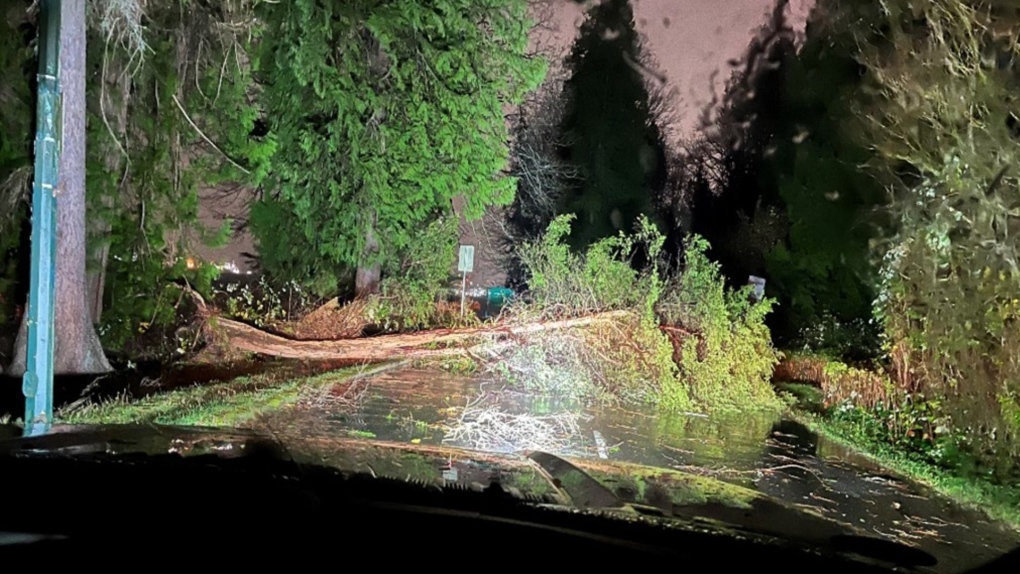'Bomb cyclone' batters B.C. coast with hurricane-force winds, downing trees onto roads and vehicles
Massive trees toppled onto roads, power lines and parked cars as hurricane-force winds battered the B.C. coast during an intense “bomb cyclone” weather event.
At its peak, the massive storm caused power outages affecting some 270,000 homes and businesses across the province, and forced the closure of several highways and roads.
- Sign up for breaking news alerts from CTV News, right at your fingertips
- The information you need to know, sent directly to you: Download the CTV News App
South of the border, a woman died after a tree toppled onto a homeless encampment in the community of Lynnwood, Wash.
Videos and images posted to social media show tree trunks and other debris littering roads on Vancouver Island and the Lower Mainland, including along the Stanley Park Causeway connecting Vancouver with the North Shore.
At least one tree also fell onto a home overnight, crashing into a family’s living room in Port Coquitlam.
Neighbour Joe Cote, whose house was struck by the same tree, said it sounded like a “bomb went off,” but no one was hurt.
“The mom and daughter were home at the time, they were pretty scared,” he said. “I saw the damage, it was just unbelievable.”
Cote said he’s been living in the area for decades, and that the intensity of these weather events has worsened, leaving him concerned that his home could be next.
“I was watching the trees, they must have moved three feet, just swaying back and forth,” he said, adding that he’s raised concerns about them to the city in the past. “We pay our taxes, let’s get some things done. We’re not going to wait for the next nightmare.”
 A downed tree is seen on Stanley Park Drive following a bomb cyclone on Nov. 20, 2024.
A downed tree is seen on Stanley Park Drive following a bomb cyclone on Nov. 20, 2024.
Environment and Climate Change Canada said winds exceeded 100 km/h in many areas, with remote Sartine Island, off the northern tip of Vancouver Island, enduring gusts of 170 km/h – the equivalent of a Category 2 hurricane.
The impacts of the bomb cyclone – a phenomenon caused by rapidly dropping atmospheric pressure at the centre of a weather system – continued on Wednesday as well.
Dozens of ferry sailings were cancelled before noon, including on major routes between Vancouver Island, the Lower Mainland and the Gulf Islands.
BC Ferries encourages travellers to check for service disruptions online before heading to a terminal.
Nearly 100,000 properties remained without electricity on Wednesday morning, the vast majority on Vancouver Island. BC Hydro said crews worked throughout the night to restore service, but were hindered by the fallen trees and debris.
In a statement, spokesperson Moira Scott said the wind was also “too strong overnight to complete the work safely” in some areas.
By Tuesday night, the storm had already forced the closure of a number of highways on Vancouver Island, including multiple stretches of Highway 4.
The key route was reopened between Port Alberni and Tofino on Wednesday morning, but remained closed between Qualicum Beach and Port Alberni, with no detour available.
DriveBC said local traffic “will be allowed through between Chalet Road and Chatsworth Road” during the shutdown.
With files from The Canadian Press
CTVNews.ca Top Stories

Donald Trump says he urged Wayne Gretzky to run for prime minister in Christmas visit
U.S. president-elect Donald Trump says he told Canadian hockey legend Wayne Gretzky he should run for prime minister during a Christmas visit but adds that the athlete declined interest in politics.
Historical mysteries solved by science in 2024
This year, scientists were able to pull back the curtain on mysteries surrounding figures across history, both known and unknown, to reveal more about their unique stories.
King Charles III focuses Christmas message on healthcare workers in year marked by royal illnesses
King Charles III used his annual Christmas message Wednesday to hail the selflessness of those who have cared for him and the Princess of Wales this year, after both were diagnosed with cancer.
Mother-daughter duo pursuing university dreams at the same time
For one University of Windsor student, what is typically a chance to gain independence from her parents has become a chance to spend more time with her biggest cheerleader — her mom.
Thousands without power on Christmas as winds, rain continue in B.C. coastal areas
Thousands of people in British Columbia are without power on Christmas Day as ongoing rainfall and strong winds collapse power lines, disrupt travel and toss around holiday decorations.
Ho! Ho! HOLY that's cold! Montreal boogie boarder in Santa suit hits St. Lawrence waters
Montreal body surfer Carlos Hebert-Plante boogie boards all year round, and donned a Santa Claus suit to hit the water on Christmas Day in -14 degree Celsius weather.
Canadian activist accuses Hong Kong of meddling, but is proud of reward for arrest
A Vancouver-based activist is accusing Hong Kong authorities of meddling in Canada’s internal affairs after police in the Chinese territory issued a warrant for his arrest.
New York taxi driver hits 6 pedestrians, 3 taken to hospital, police say
A taxicab hit six pedestrians in midtown Manhattan on Wednesday, police said, with three people — including a 9-year-old boy — transported to hospitals for their injuries.
Azerbaijani airliner crashes in Kazakhstan, killing 38 with 29 survivors, officials say
An Azerbaijani airliner with 67 people onboard crashed Wednesday near the Kazakhstani city of Aktau, killing 38 people and leaving 29 survivors, a Kazakh official said.
































